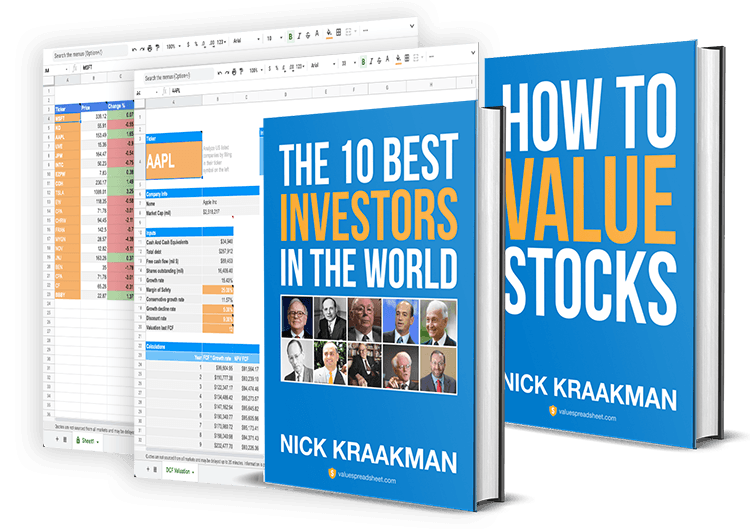Transcript
This is episode eight, no nine of the Value Investing Bootcamp podcast.
I'm your host, Nick Kraakman, and we have an interesting topic to cover today, especially for value investors.
It's the difference between price and value that we'll discuss today.
And just to dive right in, what Warren Buffett once said about this is that “Price is what you pay and value is what you get.”
This is a very interesting starting point for this discussion, because you could say that, okay, so I pay for something, let's say a television, I pay $1,000 for it.
That's a very expensive television, but doesn't matter.
Let's say you pay $1,000 for a television, doesn't it mean that the value of that TV is also $1,000?
Well, not necessarily, because the price is arbitrary.
I mean, they could have asked $2,000 for that same television, and you know, the value would be exactly the same, you would get the exact same television, you just would have paid double the price.
So, price and value are two separate entities, and on the stock market, the stock price is expected to be like an indicator of the value of the underlying company, because you have to keep in mind that a stock is a part of a business.
I mean, businesses like Google, for example, they went to the stock exchange and what happened is that Google got split up into a couple of million tiny pieces, which are now available on the stock market.
So, whenever you invest in stock of Google, you actually become part owner of Google, which is a very interesting idea.
Also, this means that the performance of a stock, so the performance of the stock price, should be related to the performance of the company, because the stock is part of the company, you know.
However, this is not always the case, and this goes straight against one of the most common financial theories on which a lot of other financial theories are based.
It's called the Efficient Market Theory, which assumes that markets are, as the name suggests, efficient, which means that stock prices always fully reflect the actual value of the company, and that it is impossible, therefore, to profit from discrepancies between price and value.
So, according to this theory, it would be impossible to purchase a stock at a price below its actual value, which is exactly what value investors do, because the Efficient Market Theory says that this discrepancy between price and value will not exist ever.
Of course, this is proven wrong in reality.
I mean, it's a pretty mathematical theory, and that's where it should remain, because in reality it just doesn't work like that.
People make mistakes, people make irrational decisions, and that's why sometimes the stock price deviates significantly from the actual value or the realistic value of what a stock should be worth, and this is why value investors can thrive, because they look and wait for those opportunities, and then dive in once they spotted a mispriced stock.
So, since prices can be highly irrational, how can you then know when something is cheap, and when it is expensive?
Some investors, they think they have the answer.
They think oh, well, I'll just look at what this stock was worth, what the stock price was a couple of months ago or a couple of years ago, and yeah, that's what it should be worth then.
Or they just look at historical prices, and then compare that with the current stock price, and if the current stock price is lower than a certain price in the past, they think, oh, well, it's cheap.
And they are right, it is cheap, relative to a previous price, but this is not what matters at all, because prices themselves say nothing about the actual value of the underlying company.
What you should look at instead is at the actual value of that part, that little piece of the company that you own, because you own its stock.
So, how much should that stock realistically be worth based on the performance of the underlying business, and then compare the current stock price with that value.
And so price is very important, but only in relation to value, and not in relation to previous price points.
Because while stock prices can deviate from value in the short run, eventually people will wake up, and then they will realize that stock is grossly mispriced, and this difference between price and value will then, this gap, will close and prices will eventually reflect actual valued based on the performance of the underlying business.
Warren Buffett said that “In the short run the market is like a voting machine, and in the long run, it's a weighing machine.”
So, in the short run, prices move up and down, and it's unpredictable what will happen, but in the long run, price and value will eventually converge, and that's the moment when you sell, because that's when you realize your profits and it would be foolish to hold on to it.
Of course, sometimes stocks get way overvalued as well, and you will miss out on that gain, but at least you minimize the risk, because you should never own overvalued stocks.
At that point you sell, you look for better opportunities to invest your money.
Yeah, when we're talking about how prices can divert from actual value, historical stock market bubbles, and other sorts of bubbles like real estate bubbles, etc. are prime examples of moments in time when prices deviated significantly from underlying business values or assets values.
For example, in the .com bubble, technology companies that just rose to immense valuations, so the stock prices went up like crazy and the underlying companies were actually losing money, they were not generating any profits.
So, this was based on thin air, those stock price increases were based on thin air and false hope, and eventually, stocks come crashing down.
People again, like I said, wake up, they realize, oops, this is going nowhere, this is based on nothing, and then everything collapses, along with a lot of people's dreams and a lot of people's hard earned savings.
So, don't get caught up in this and always look at stock prices relative to value, because a stock can only be cheap relative to its underlying value and cannot be cheap relative to a previous price point.
I would like to explain to you exactly how you can actually calculate this value of a company or of a stock, but I guess that would be a bit too difficult for an audio podcast.
You'll need some visuals with it, and you need some formulas and calculations, so we'll cover that in the course instead.
You can also go to valuespreadsheet.com, where you can find some free spreadsheets which can help you calculate the true value or intrinsic value of a company, and then use that to estimate whether a company is actually cheap or expensive.
So I'll talk to you next time in the next-- next lesson I wanted to say.
In the next podcast episode, we’ll talk about the importance of financial statements and all the information that they contain.
So yeah, I'll see you in the next episode, and be sure to leave a rating and a comment on iTunes if you like the show so far.
Have a great day!
If you enjoyed today's show, head over to ValueInvestingBootcamp.com to find out more on how you can invest like the pros, manage your own portfolio with confidence, and consistently earn mind boggling returns on the stock market.



